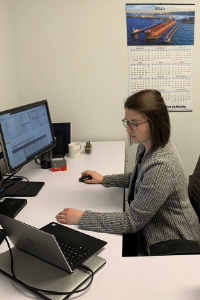What is going on at the U.S. Grains Council (USGC) on any random Wednesday?
On March 17, members of the Council’s global staff tracked their collective day, equally highlighting important and more routine events to give Global Update readers a clearer picture of the role the Council plays in promoting U.S. grains and ethanol to markets around the world.
In this part one of a two-part series, we illustrate how constant communication between staff members – both in the D.C. headquarters and around the world – allows the Council to focus on achieving its mission of developing markets, enabling trade and improving lives.

Keeping up to date with international trade policy developments as they relate to U.S. ethanol and trade is an integral part of USGC Manager of Ethanol Trade Policy and Economics Isabelle Ausdal’s newly assumed position in the Washington, D.C., headquarters.
Ausdal’s primary activity on Mar. 17 was preparing research and coordinating with an overseas consultant in anticipation of a presentation to the Council’s Ethanol Advisory Team (A-Team) regarding ethanol’s role in the Paris Agreement and the impact of the U.S. rejoining that pact.
“As we see a global push to decarbonize the transportation sector and reduce greenhouse gas emissions, it is critical that we continue to elevate the environmental and economic benefits of ethanol at the international policy level,” Ausdal said.

Ellen Zimmerman, USGC director of industry relations, was on that call, but not before chucking through email, preparing for a funding presentation and discussing emergency planning for in-person events with another member of her staff.
“My role, simply put, is to connect members with opportunities and staff around the world. We have 173 members, staff in dozens of places around the world and countless programs,” Zimmerman said. “This means that every day is different, and I’m focused on engaging all the right people for cross-cutting issues. This gives me an opportunity to interact with different functions of both our membership and our global team.”
Zimmerman’s work continued in the afternoon with a variety of tasks including reviewing a hotel contract and preparing a negotiation strategy; following up from a meeting with staff and members from a state checkoff organization; editing and updating a Council member alert; discussing a game plan for converting a non-member organization into a member; and setting up an agenda for a call with state executives.

Michael Lu, USGC’s director across the globe in Taiwan, also engaged on ethanol-focused work, speaking with Ausdal about the ethanol policy environment in Taiwan.
“The meeting was introductory and helped us both get to know each other better, allowed Isabelle to gain an understanding of the ethanol policy environment and constraints in Taiwan and discuss how her role can best support Taiwan ethanol policy communication.”
Afterwards, Lu reviewed and edited a Global Update story on the GM Food/Feed Safety Assessment Symposium in Taiwan; confirmed collaborative 2021 workshops between the Council and the National Animal Industry Foundation (NAIF) on grain market analysis and outlook for U.S. distiller’s dried grains with solubles (DDGS); and met with members of the Taiwan Poultry Association and a professor at National Chung Hsin University to discuss their annual Poultry Health and Farm Management Forum, at which the Council will be a key sponsor.
“Last year, there were more than 450 attendees at the forum,” Lu said. “It’s a good platform for USGC to engage those stakeholders in the animal production and health industry including government officials, professors and experts, veterinarians, agribusiness people and farmers.”
In the afternoon, Lu received an invitation from USDA’s Foreign Agricultural Service (FAS) in Taiwan to join an event featuring a new social media platform called United Tastes in Taiwan.
Before his day ended, Lu also got word from the Taiwan Feed Industry Association that he will be a featured speaker at its feed production and safety assessment seminar in April.
While Lu and Ausdal were meeting, USGC Vice President and COO Kim Atkins, who was busy in the morning working on a corn sustainability project, joined Zimmerman for a funding presentation offered to the North Dakota Corn Utilization Council.
“Each year the Council meets with many of our checkoff organizations to provide an update on Council programs and priorities as well as to request support for the year ahead,” Atkins said. “Spring and summer are traditionally busy time periods for this work. I enjoy the opportunity to meet with our famer leaders to talk about the work that our team is doing around the world and answer any questions they might have related to our activities or about trade in general.”

Throughout her day, Atkins slotted in interviews for an open position on the Council staff.
“One of my roles at the Council is to help the organization fill vacancies,” Atkins said. “In the virtual world, this means participating in a Zoom meeting, which certainly has its pros and cons. While meeting someone virtually isn’t the same as having the opportunity to shake hands and sit across the table, it has allowed for a more efficient interviewing process.”
Rounding back on Ausdal’s afternoon, she continued with ongoing analyses of various countries’ new and expanded national ethanol policies, including Brazil’s RenovaBio program, Canada’s Clean Fuel Standard (CFS) and the European Union’s Renewable Energy Directive (RED II). She finished her day by compiling information on relevant energy policy changes and ethanol market demand shifts to be distributed to USGC’s overseas offices.
“I look forward to assisting in the implementation of successful biofuels policies and programs, and I continue to plan meetings with USGC’s regional and country directors to determine policy development targets,” Ausdal said, a nod to the fact that the Council’s collective work for trade is complex, evolving and never done.
The common seed of communication between staff at the Council provides fertile ground on which all its programming grows to create fruitful benefits for U.S. grains and those who grow and sell them.
About The U.S. Grains Council
The U.S. Grains Council develops export markets for U.S. barley, corn, sorghum and related products including distiller’s dried grains with solubles (DDGS) and ethanol. With full-time presence in 28 locations, the Council operates programs in more than 50 countries and the European Union. The Council believes exports are vital to global economic development and to U.S. agriculture’s profitability. Detailed information about the Council and its programs is online at www.grains.org.
